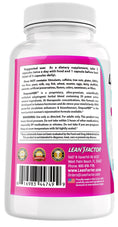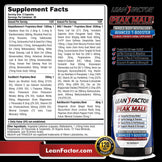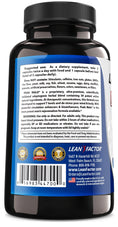Description
Description
Benjamin Franklin once famously said,
“If you fail to plan, you are planning to fail”
In today’s article, I will discuss what I believe is the one factor that overshadows all the others.
If I were asked to pick one of the most important factors for why we often fail at restoring our well being, I would have to say it is all about people’s relationship with food.
When you compare 100 years ago to where we are today, it is obvious, a human being’s relationship (specifically in the western world) with food has changed dramatically. We went from using what nature provided to us for surviving and thriving, to the overconsumption of “instant gratification” foods.
Areas all over the world that respect and keep old fashioned traditions alive seem to have the best understanding and symbiotic relationship with food. These long-standing traditions provide people with a healthy respect and understanding for the why’s, when's and how's in regards to the foods they eat. Some of the specifics are:
- How the foods are grown
- How and by whom the foods are prepared
- The environment they are eaten in (relaxed or rushed)
All of these factors can either make food and eat a more enjoyable and positive experience or, a horrible one. Here in the United States, we use food as a tool to simply fill an empty stomach or satisfy an emotional need. We have no respect for food, its nourishing qualities (both physically and socially) and the joy it is supposed to give us.
I want to remind you that digestion starts in the mouth, so…...
- If you swallow your food whole because you are in a rush, how do you expect to enjoy and properly digest what you have eaten?
- If you are working and in a stressful situation when eating, how do you expect to enjoy and properly digest your food?
Are you still wondering why so many Americans have digestive issues and why antacids are one of the biggest selling over-the-counter medicines?
Are the choices we make really ours?
The decisions we make (whether good or bad) in the end are still our decisions, but I have some good news. This is not an “out” for you to not take responsibility for the end result, but based on your state of mind at that moment, your ability to make good choices may be compromised.
Allow me to explain.
A good majority of the population is addicted to something (processed sugar, caffeine, electronics and materialist items) which can have very powerful and damaging effects on the brain. We also live in a society filled with distractions which have affected the average person’s attention span (There is never a goldfish around when you need one).
Have you heard the expression “If it is too good to be true it probably is”?
One of the best examples of a substance that is crippling our society is processed sugar.
Let me be clear about one important point. Contrary to a reductionists belief, not all sugar is created equal. Sugar that is contained in real whole foods like fruits and vegetables have a very different effect on the body versus processed sugars. In my opinion, anyone who makes the statement “Its all sugar in the end” should get into there time machine and go back to 1920. If that is your belief, then I suppose all types of fats have the same effects on the body as well, right?
Dr. Daniel Amen who has done over 100,000 brain scans in his career has shown the profound effects that addictive substances like processed sugar have on the brain. In a 2017 article titled “What do sugar and cocaine have in common”, Dr. Amen states on brainmd.com:
“Eating sugary foods makes people hungry and tired, and causes them to gain weight. Refined sugar is void of minerals needed for enzymes, can cause mineral deficiencies, interferes with the actions of calcium and magnesium, increases inflammation, increases erratic brain cell firing, and has been implicated in aggression”. Based on their research it was also concluded “Sugar consumption has been associated with depression, ADHD and hyperactivity, increased triglycerides, lower HDL, and higher LDL levels. Brain imaging studies showed sugar causes increased slow brain waves and a study at UCLA shows that sugar alters learning and memory”. (1)
In a review titled “Sugar addiction: pushing the drug-sugar analogy to the limit” it was stated:
“Available evidence in humans shows that sugar and sweetness can induce reward and craving that are comparable in magnitude to those induced by addictive drugs. Although this evidence is limited by the inherent difficulty of comparing different types of rewards and psychological experiences in humans, it is nevertheless supported by recent experimental research on sugar and sweet reward in laboratory rats. Overall, this research has revealed that sugar and sweet reward can not only substitute to addictive drugs, like cocaine but can even be more rewarding and attractive. At the neurobiological level, the neural substrates of sugar and sweet reward appear to be more robust than those of cocaine (i.e., more resistant to functional failures), possibly reflecting past selective evolutionary pressures for seeking and taking foods high in sugar and calories.” (2)
Do you have a healthy relationship with food?
When the smoke and fog finally clears, what you have left is either a healthy or unhealthy relationship with food. If you grew up and live/ed in one of the many countries where people were taught from birth the true nourishing qualities (both physically and socially) that food provides, chances are, you have a healthy relationship with food. Chances are, you have wonderful memories of grandma cooking a great meal for the whole family every Sunday (from fresh wholesome ingredients). If this is all true, then I am also willing to bet, your current family is carrying on the same traditions. The idea of passing down traditions to the next generation is how we define a healthy relationship with food.
Are you using your food to nourish or for instant gratification?
Here in western civilization, I think it is safe to say, the overall general relationship with food is very poor. I want you to think about this important fact...
Why in America do we have 2 billion different diets and magic bullets (most of which fail) and in other countries there is one way of eating for each area of that country?
For example, the Mediterranean lifestyle. This lifestyle is based on farm to table, high quality whole fresh nourishing foods that are traditionally prepared with love, and eaten in a relaxing environment.
The answer to why we don’t have a good relationship with food is…We don’t appreciate the nourishing qualities that food has on us both physically and socially. Even worse, we look at food in a reductionist manner. We are so “count your macros” obsessed and focus on numbers and not diets that look at quality and freshness as the priority. When you are only worried about the perfect ratio of macros and not the quality of food that provides you those macros, you end up with the perfect ratio of crap food-like substances.
Is it any wonder why America is in this current state of health?
The other part of this puzzle is the experiences we associate with food. Often times, if you are someone who eats out of frustration, not only will you often make bad choices but, what do you think you will associate those foods with? This is the true definition of an unhealthy relationship with food. I don’t recall ever seeing someone who was angry or frustrated say,
“I am so mad, I wish I had a green smoothie with extra kale!”
What you often see are people grabbing a highly processed “food-like” substance with no nourishing value. This is simply part of wanting to feel better via instant gratification and not through proper nourishment.
Please understand, this behavior comes from years of making the same bad choices over and over. The worst part, the “satisfaction” that these food-like substances give you, make you believe, you are actually doing something good for yourself. Think back to how you felt 30 minutes after you have eaten that horrible processed food. Not a good choice right?
Simply put, you picked that food because either you were taught by others to behave this way or, you taught yourself (through habit) to pick the foods that give you a feeling of instant gratification. We all want to feel better now.
This is not how we define a healthy relationship with food
On the other end of the spectrum, if you are eating a fresh homemade meal with friends and family every Sunday in a relaxing environment, I am willing to bet you would have a more positive association with those foods.
Here are three important points to keep in mind if you want to avoid failure:
- If at some point you wish to have a successful outcome, understanding why and at what point (within the process) we fail is extremely important.
- Making random changes to a flawed system does not guarantee a successful outcome.
- Without understanding why the changes need to be made, you are simply setting yourself up for failure over and over.
Insanity is defined as “doing the same thing over and over expecting different results”.
I am not saying that you are insane (well maybe a little) but here is just another wonderful example of how a reductionist way of thinking never wins the race.
When holistic health talks about looking at the true cause of an issue, perhaps we need to start asking the “whys” instead of the “hows” in order to understand why we are all so sick and failing to get well.
How can you expect changes you make to have profound results if, you don’t have a true understanding of why you are making those changes?
References
1) https://www.brainmdhealth.com/blog/what-do-sugar-and-cocaine-have-in-common/
2) Ahmed SH1, Guillem K, Vandaele Y. 2013. “Sugar addiction: Pushing the drug-sugar analogy to the limit” Pubmed.gov, Sourced 8/14/18 https://www.ncbi.nlm.nih.gov/pubmed/23719144
About Michael Stuchiner
Michael Stuchiner is an experienced Master Herbalist, the Head of Education for Z Natural Foods, a teacher, and an accomplished author. With an 18-year specialization in medicinal herbs, Mike also has a vast knowledge in tonic and adaptogenic herbalism. Mike has enjoyed a 25-year career as an elite-level competitive powerlifter where he learned to heal his ‘mind and body’ as an avid user of herbal remedies.
As an “in-the-trenches” herbalist, Mike has done more than 85 speaking engagements, consulted with clients ranging from young to elderly, worked with athletes in virtually all sports and with clients who have “dis-ease” states of a wide variety. Mike also mentors student Master Herbalists and will continue to teach the next generation to grow a deeper wisdom of the human body through appropriate herbal remedies.



















